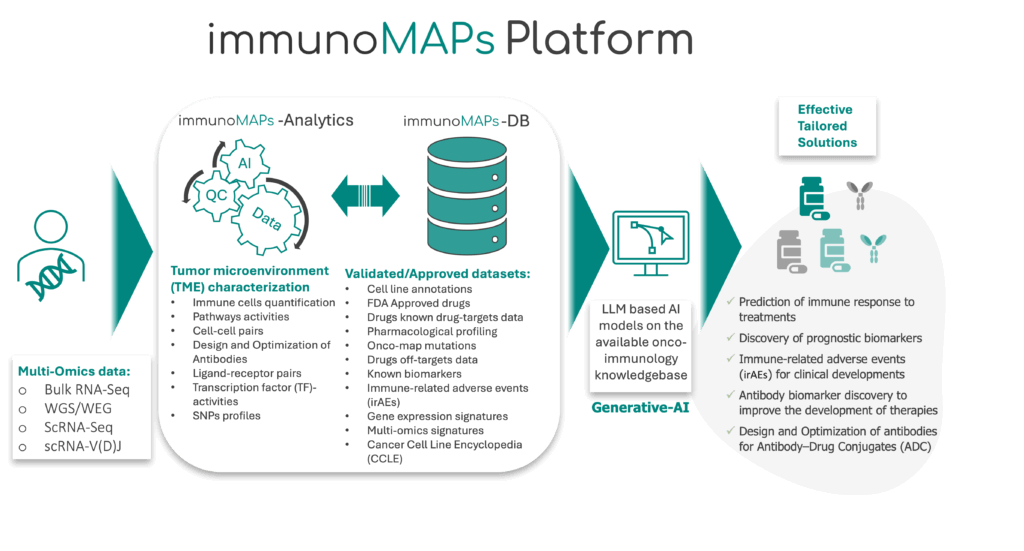Welcome to immunoMAPs analytical dashboard
immunoMAPs analytical dashboard predicts patient specific immune biomarkers and enables oncologists to select and plan the best targeted therapies

What does immunoMAPs platform do?
Our company has created a personalised immuno-oncology tool called immunoMAPs. Using patient-derived tumour microenvironment (TME) data, the immunoMAPs analytical dashboard predicts specific immune biomarkers for each patient and enables oncologists to select and plan the best available approved targeted therapies.


Proprietary AI-driven algorithms based on scientific research
Our proprietary AI-driven algorithms for immunotherapy are developed by using latest scientific research to analyze large amounts of multi-omics healthcare/clinical data. These algorithms enable the identification of novel immune biomarkers and personalized immunotherapy solutions for cancer treatment.
Assess effectiveness of Immuno-therapy and to predict Immune bio-markers for personalized therapy
Immunotherapy has shown significant effectiveness in treating various types of cancer by harnessing the power of the patient's immune system to attack cancer cells. However, not all patients respond to immunotherapy, and identifying the right patient population and the most effective treatment approach is crucial for successful personalized therapy. This is where immune biomarkers come in - they can help predict which patients are likely to respond to immunotherapy and which treatment approach would be most effective for them. By analyzing tumor microenvironment and immune biomarkers, personalized therapy can be tailored to the patient's unique immune profile, increasing the chances of a successful outcome.

mRNA-based vaccine development for oncology
mRNA-based vaccine development for oncology involves the use of messenger RNA (mRNA) to stimulate an immune response against cancer cells. This approach involves the use of tumor-specific antigens encoded in mRNA molecules that are delivered to the patient's immune cells, such as dendritic cells, to activate an immune response against cancer cells. The use of mRNA-based vaccines for oncology is a promising approach for developing personalized cancer therapies, as they can be designed to target specific mutations or biomarkers unique to an individual's tumor. This approach is still in the early stages of development.
Design and Optimization of antibodies for Antibody–Drug Conjugates
Designing and optimizing antibodies for antibody-drug conjugates (ADCs) is an important area of research in oncology. ADCs are a type of targeted therapy that combines the specificity of monoclonal antibodies with the cytotoxicity of chemotherapy drugs. The design and optimization of ADCs involves selecting an appropriate target antigen on the surface of cancer cells, identifying a suitable cytotoxic drug, and designing a linker that connects the two. This process requires careful consideration of factors such as the pharmacokinetics and pharmacodynamics of the ADC, as well as its efficacy and safety.
Screening and ranking of existing antibody sequences
Screening and ranking of existing antibody sequences for oncology typically involves the following steps: Identifying the target antigen: The first step is to identify the target antigen that the antibody needs to bind to. This can be done through various techniques such as cell-based assays, proteomics, and genomics. Selection of antibody library: An appropriate antibody library is selected based on the target antigen and other requirements such as specificity, affinity, and stability. High-throughput screening: The selected antibody library is then screened using high-throughput techniques such as phage display, yeast display, or ribosome display. This allows for the rapid screening of a large number of antibody candidates. Ranking and optimization: The identified antibody candidates are ranked based on their binding affinity, specificity, stability, and other properties. The top candidates are then optimized for improved efficacy and reduced toxicity. Preclinical and clinical evaluation: The optimized antibodies are then evaluated in preclinical and clinical studies to determine their safety and efficacy. This involves testing the antibodies in animal models and human trials to assess their pharmacokinetics, pharmacodynamics, and immunogenicity.
Immune cells quantification
Immune cell quantification is a process that involves measuring the numbers and types of immune cells in a tissue sample, blood or any other biological sample. In the context of oncology, immune cell quantification is used to determine the immune cell infiltrate within a tumor microenvironment. This information can be used to assess the efficacy of immunotherapy and predict the response of patients to treatment. Techniques used for immune cell quantification in oncology include flow cytometry, immunohistochemistry, and gene expression profiling.
Would you like to start a project with us?
Reach out on the given number or write us an email for further queries regarding project requirements


